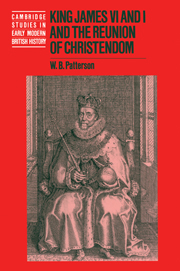Book contents
- Frontmatter
- Contents
- Preface
- List of abbreviations
- A note on dating and quotations from manuscripts
- 1 Scottish reconciler
- 2 Call for an ecumenical council
- 3 Oath of Allegiance
- 4 Foreign visitors
- 5 The Synod of Tonneins
- 6 Relations with the Greek Orthodox Church
- 7 Marco Antonio De Dominis
- 8 The Synod of Dort
- 9 Outbreak of the Thirty Years' War
- 10 Last years and conclusion
- Bibliography
- Index
- CAMBRIDGE STUDIES IN EARLY MODERN BRITISH HISTORY
6 - Relations with the Greek Orthodox Church
Published online by Cambridge University Press: 04 August 2010
- Frontmatter
- Contents
- Preface
- List of abbreviations
- A note on dating and quotations from manuscripts
- 1 Scottish reconciler
- 2 Call for an ecumenical council
- 3 Oath of Allegiance
- 4 Foreign visitors
- 5 The Synod of Tonneins
- 6 Relations with the Greek Orthodox Church
- 7 Marco Antonio De Dominis
- 8 The Synod of Dort
- 9 Outbreak of the Thirty Years' War
- 10 Last years and conclusion
- Bibliography
- Index
- CAMBRIDGE STUDIES IN EARLY MODERN BRITISH HISTORY
Summary
The Greek Orthodox Church, rich in history and tradition and linked through the centuries to the Hellenistic world in which Christianity first spread beyond Palestine, maintained a precarious existence in the early seventeenth century. The Ottoman Turks, who overran the remnants of the Byzantine Empire in the fourteenth and fifteenth centuries and captured Constantinople in 1453, allowed Christians to practice their religion. The Ottoman rulers, Muslims themselves, accorded Christians the status of a nation within the Ottoman Empire, entitled to worship according to Christian laws. In its profession of religious toleration, the Ottoman Empire was in advance of any state in western Europe. Yet, in practice, Ottoman rule was almost disastrous for the Greek Church. Most of the prominent church buildings in Greece and Asia Minor were destroyed in war, allowed to fall into ruin, or converted into mosques. New church buildings could only be erected with special permission, which the Turkish authorities were often reluctant to give. Christians, like other subject peoples, were heavily taxed and forced to provide labor for the conquerors. Boys were regularly taken from Christian families to be brought up as Muslims and trained as bureaucrats or soldiers in the corps of Janissaries. Local officials harassed and exploited Christians through legal or extra-legal means to the point that many were impoverished or forced into exile. Even more damaging for a church which had produced outstanding theologians and had preserved many of the texts of ancient Greek philosophy and literature, the Turks made it virtually impossible for most Greeks in the Empire, outside Istanbul itself, to receive more than the rudiments of an education.
- Type
- Chapter
- Information
- King James VI and I and the Reunion of Christendom , pp. 196 - 219Publisher: Cambridge University PressPrint publication year: 1998



